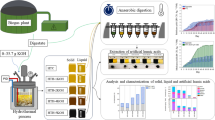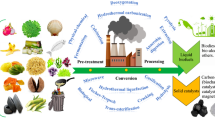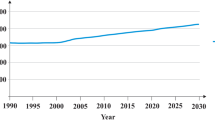Abstract
With the aim of upgrading current food waste (FW) management strategy, a novel FW hydrothermal pretreatment and air-drying incineration system is proposed and optimized from an energy and exergy perspective. Parameters considered include the extracted steam quality, the final moisture content of dehydrated FW, and the reactor thermal efficiency. Results show that optimal working condition can be obtained when the temperature and pressure of extracted steam are 159 °C and 0.17 MPa, the final moisture content of dehydrated FW is 10%, and the reactor thermal efficiency is 90%. Under such circumstance, the optimal steam energy and exergy increments reach 194.92 and 324.50 kJ/kg-FW, respectively. The novel system is then applied under the local conditions of Hangzhou, China. Results show that approximately 2.7 or 11.6% (from energy or exergy analysis perspective) of electricity can be additionally generated from 1 ton of MSW if the proposed novel FW system is implemented. Besides, comparisons between energy and exergy analysis are also discussed.





Similar content being viewed by others
References
Baran B, Mamis MS, Alagoz BB (2016) Utilization of energy from waste potential in Turkey as distributed secondary renewable energy source. Renew Energy 90:493–500
Bianchi M, Branchini L, De Pascale A (2014) Combining waste-to-energy steam cycle with gas turbine units. Appl Energy 130:764–773
Boldrin A, Hartling KR, Laugen M, Christensen TH (2010) Environmental inventory modelling of the use of compost and peat in growth media preparation. Resour Conserv Recycl 54:1250–1260
Branchini L (2015) Waste-to-energy: advanced cycles and new design concepts for efficient power plants. Springer
Center HMSWDaS (2010) Hangzhou municipal solid waste physical property analysis and disposal method. Hangzhou
Chen B-Y, Zhao B-C, Li M-F, Liu Q-Y, Sun R-C (2017) Fractionation of rapeseed straw by hydrothermal/dilute acid pretreatment combined with alkali post-treatment for improving its enzymatic hydrolysis. Bioresour Technol 225:127–133
Chenglong F (2013) Experimental study on the thermal hydrolysis pretreatment of mechanical dewatering sewage sludge. Zhejiang University, Hangzhou
Chi Y, Dong J, Tang Y, Huang Q, Ni M (2015) Life cycle assessment of municipal solid waste source-separated collection and integrated waste management systems in Hangzhou, China. J Mater Cycles Waste Manage 17:695–706
Choi Y-i, Jung B-g, Sung N-c, Han Y-r (2015) A study on the drying characteristics from mixture of food waste and sawdust by using microwave/inner-cycle thermal-air drying process. J Mater Cycles Waste Manage 17:359–368
Council EU (2003) Council Decision 2003/33/EC of 19 December 2002 establishing criteria and procedures for the acceptance of waste at landfills persuant to Article 16 of and Annex II to Directive 1999/31/EC[J]. OJEC 16(2003): L11
Dincer I (2002) The role of exergy in energy policy making. Energy Policy 30:137–149
Dobric S (2014) Utilizing waste heat from metal industry for drying of organic waste
Dong J, Ni M, Chi Y, Zou D, Fu C (2013) Life cycle and economic assessment of source-separated MSW collection with regard to greenhouse gas emissions: a case study in China. Environ Sci Pollut Res 20:5512–5524
Dong J, Chi Y, Zou D, Fu C, Huang Q, Ni M (2014) Comparison of municipal solid waste treatment technologies from a life cycle perspective in China. Waste Manag Res 32:13–23
Feng G, Guo Y, Tan W (2015) Effects of thermal hydrolysis temperature on physical characteristics of municipal sludge. Water Sci Technol 72:2018–2026
Kumar P, Barrett DM, Delwiche MJ, Stroeve P (2009) Methods for pretreatment of lignocellulosic biomass for efficient hydrolysis and biofuel production. Ind Eng Chem Res 48:3713–3729
Lai C-M, Ke G-R, Chung M-Y (2009) Potentials of food wastes for power generation and energy conservation in Taiwan. Renew Energy 34:1913–1915
Latif M, Ahmad A, Ghufran R, Wahid Z (2012) Effect of temperature and organic loading rate on upflow anaerobic sludge blanket reactor and CH4 production by treating liquidized food waste. Environ Prog Sustain Energy 31:114–121
Lee Jr JW (2005) Method and apparatus for the treatment of particulate biodegradable organic waste. US Patents
Lee Jr JW (2007) Apparatus for the treatment of particulate biodegradable organic waste. US Patents
Lee Jr JW (2011) Treatment of particulate biodegradable organic waste by thermal hydrolysis using condensate recycle. US Patents
Li W, Guo J, Cheng H, Wang W, Dong R (2017) Two-phase anaerobic digestion of municipal solid wastes enhanced by hydrothermal pretreatment: viability, performance and microbial community evaluation. Appl Energy 189:613–622
Li Y, Jin Y, Li J (2016) Enhanced split-phase resource utilization of kitchen waste by thermal pre-treatment. Energy 98:155–167
Lissens G, Thomsen AB, De Baere L, Verstraete W, Ahring BK (2004) Thermal wet oxidation improves anaerobic biodegradability of raw and digested Biowaste. Environ Sci Technol 38:3418–3424
Liu H, Ma X, Xie C (2016) Influence of microwave drying on the combustion characteristics of food waste. Dry Technol
Liu M, Yan J, Bai B, Chong D, Guo X, Xiao F (2011) Theoretical study and case analysis for a predried lignite-fired power system. Dry Technol 29:1219–1229
Liu Y, Li X, Kang X (2015) Effect of volume ratio on anaerobic co-digestion of thermal hydrolysis of food waste with activated sludge. Int Biodeterior Biodegrad 102:154–158
Lundie S, Peters GM (2005) Life cycle assessment of food waste management options. J Clean Prod 13:275–286
Müller C (2007) Anaerobic digestion of biodegradable solid waste in low-and middle-income countries. Sandec Report
Mahmood R, Parshetti GK, Balasubramanian R (2016) Energy, exergy and techno-economic analyses of hydrothermal oxidation of food waste to produce hydro-char and bio-oil. Energy 102:187–198
Pham TPT, Kaushik R, Parshetti GK, Mahmood R, Balasubramanian R (2015) Food waste-to-energy conversion technologies: current status and future directions. Waste Manag 38:399–408
Rivero R, Garfias M (2006) Standard chemical exergy of elements updated. Energy 31:3310–3326
Sarker MSH, Ibrahim MN, Aziz NA, Punan MS (2015) Energy and exergy analysis of industrial fluidized bed drying of paddy. Energy 84:131–138
Schieder D, Schneider R, Bischof F (2000) Thermal hydrolysis (TDH) as a pretreatment method for the digestion of organic waste. Water Sci Technol 41:181–187
Solheim OE, Nilsen PJ (2014) Method and device for thermal biological breakdown and dewatering of biomass. Google Patents
Song HW, Park KJ, Han SK, Jung HS (2014) Thermal conductivity characteristics of dewatered sewage sludge by thermal hydrolysis reaction. J Air Waste Manage Assoc 64:1384–1389
Sotiropoulos A, Malamis D, Loizidou M (2015) Dehydration of domestic food waste at source as an alternative approach for food waste management. Waste Biomass Valoriz 6:167–176
Sotiropoulos A, Malamis D, Michailidis P, Krokida M, Loizidou M (2016) Research on the drying kinetics of household food waste for the development and optimization of domestic waste drying technique. Environ Technol 37:929–939
Stabnikova O, Liu X, Wang J (2008) Digestion of frozen/thawed food waste in the hybrid anaerobic solid–liquid system. Waste Manag 28:1654–1659
Tang Y, Dong J, Chi Y, Zhou Z, Ni M (2016) Energy and exergy analyses of fluidized-bed municipal solid waste air gasification. Energy Fuel 30:7629–7637
Yamankaradeniz N (2016) Thermodynamic performance assessments of a district heating system with geothermal by using advanced exergy analysis. Renew Energy 85:965–972
Zhang Y, Li B, Li H, Zhang B (2012) Exergy analysis of biomass utilization via steam gasification and partial oxidation. Thermochim Acta 538:21–28
Acknowledgements
This project is supported by the National Natural Science Foundation of China (No. 51676170) and the Program of Introducing Talents of Discipline to University (B08026).
Author information
Authors and Affiliations
Corresponding author
Additional information
Responsible editor: Bingcai Pan
Highlights
• A novel FW hydrothermal pretreatment system is proposed.
• Energy and exergy are analyzed and compared to optimize thermodynamic efficiency.
• Extracted steam quality, final moisture content, and reactor thermal efficiency are varied.
• A case study is performed with regard to local conditions of Hangzhou, China
Rights and permissions
About this article
Cite this article
Tang, Y., Dong, J., Chi, Y. et al. Energy and exergy optimization of food waste pretreatment and incineration. Environ Sci Pollut Res 24, 18434–18443 (2017). https://doi.org/10.1007/s11356-017-9396-4
Received:
Accepted:
Published:
Issue Date:
DOI: https://doi.org/10.1007/s11356-017-9396-4




